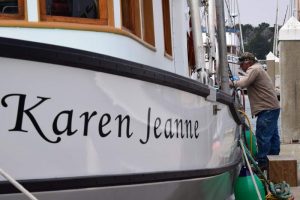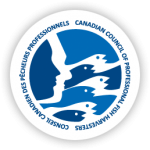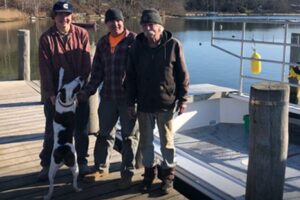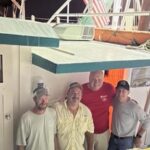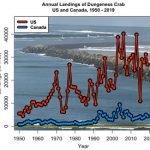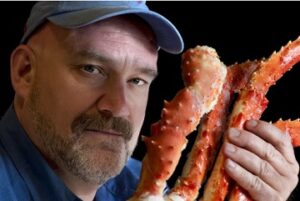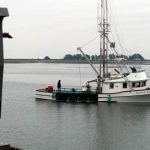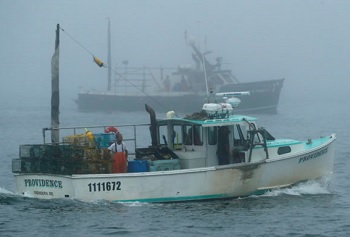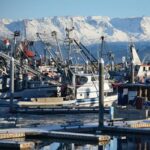Tag Archives: shrimp boats
Tom Poland – Wake-up call aboard the F/V Pamela Sue
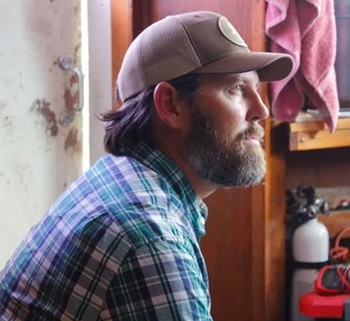 I got up at 4:30 a.m. to go to two Carolina bays in the Francis Marion National Forest. Hours later I left pitcher plants, blue irises and Halloween pennant dragonflies and headed to the McClellanville Diner for a platter of fresh-caught domestic shrimp. Consumers take note: it was not frozen, imported shrimp. After lunch I went into McClellanville, a lovely fishing village that’s home to South Carolina’s largest fleet of shrimp boats. As I made my way into McClellanville, I passed T.W. Graham & Co., another great local restaurant. Hand-painted on its windows were “Support #Freshlocal” and “God Bless Our Shrimpers.” Carolina Seafood sits on Jeremy Creek, a creek named after King Jeremy, a Seewee Indian chief whose tribe lived along the creek’s banks. There I met Capt. Bryan Jones. He catches shrimp, no easy task. Besides the hard and dangerous work, he must overcome many a challenge. Capt. Jones showed me around his boat, Pamela Sue. more, >>CLICK TO READ<< 08:31
I got up at 4:30 a.m. to go to two Carolina bays in the Francis Marion National Forest. Hours later I left pitcher plants, blue irises and Halloween pennant dragonflies and headed to the McClellanville Diner for a platter of fresh-caught domestic shrimp. Consumers take note: it was not frozen, imported shrimp. After lunch I went into McClellanville, a lovely fishing village that’s home to South Carolina’s largest fleet of shrimp boats. As I made my way into McClellanville, I passed T.W. Graham & Co., another great local restaurant. Hand-painted on its windows were “Support #Freshlocal” and “God Bless Our Shrimpers.” Carolina Seafood sits on Jeremy Creek, a creek named after King Jeremy, a Seewee Indian chief whose tribe lived along the creek’s banks. There I met Capt. Bryan Jones. He catches shrimp, no easy task. Besides the hard and dangerous work, he must overcome many a challenge. Capt. Jones showed me around his boat, Pamela Sue. more, >>CLICK TO READ<< 08:31
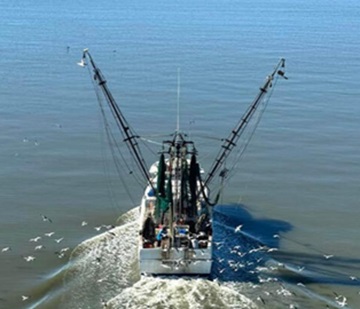
Wild-Caught Shrimp: South Carolina’s Long History
There’s something positively serene about watching shrimp boats trawling our coastal waters. Shrimping has been an important part of our culture in Beaufort and all of South Carolina since long before anyone can remember. In fact it’s been a labor of love for fishermen since before the Civil War and is still alive and kicking today with a thriving market served by dedicated commercial fishermen in the Palmetto State. Shrimp are America’s most valuable and most popular seafood, according to the NOAA Fisheries, and SCDNR tells us that South Carolina is home to three species of shrimp: brown shrimp, white shrimp, and pink shrimp. Brown and white shrimp are more common than pink shrimp, but all three taste the same. >>click to read<< 20:47
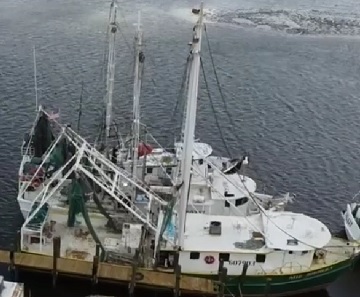
Southwest Florida’s shrimping industry struggles to stay afloat after hurricane devastation
Erickson & Jensen Seafood now have five of their shrimp boats back in the water, but their operations are far from normal since Hurricane Ian. “We had a nice ongoing business and we were very secure,” Grant Erickson said referring to his 75-year-old business. “Been doing this for a long, long time. And then all of a sudden in a 12-hour period, the storm just took us completely out of what we were doing.” Before Hurricane Ian, Erickson and Jensen had 11 ships bringing in tons of shrimp. From rebuilding the docks and their buildings, it’s been difficult to find the money. Video, >click to read< 13:27
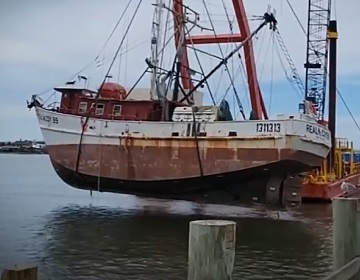
One by one, shrimp boats are being lifted back into the water on San Carlos Island
They’re lifting a 290,000-pound boat after Hurricane Ian tossed it around and brought it on land. Scott Schofield knows a thing or two about watching the big shrimp boats being lifted and removed because he’s been out here watching, and recording, every move of these boats. Meticulous is one way to describe it. Painstaking is another. The process takes anywhere from a day and a half to two days. For boats like F/V Captain Eddie 99, it’ll be the full two days. Video, >click to read< 11:34
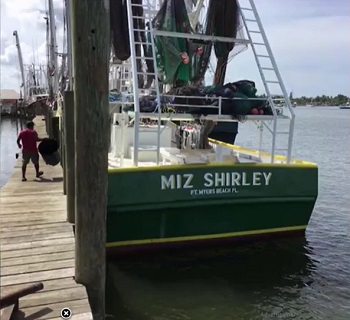
Crews hope to return pile of shrimp boats on Fort Myers Beach to water within 70 days
“Boats that are all tangled up and the ones that we started on are the ones that are along the edges of the water,” Vice President of Beyel Brothers, Steven Beyel said. So far, of the roughly 45 boats on land, three have returned to the water. And they are mostly in good shape. “We were able to get ours back in the water yesterday afternoon,” James Drigger said. Drigger’s boat is the ‘Miz Shirley’. “Words can’t even explain how thankful we are,” he said.Video, >click to read< 09:34
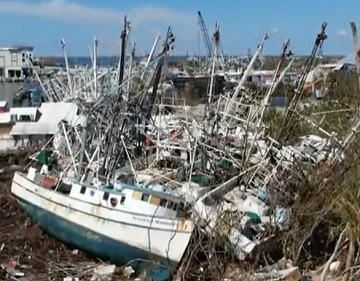
Fishing industry in Lee County ‘wiped out’ by Hurricane Ian
Among the wreckage, a small lime-green building, the Island Seafood Market, is somehow still standing. Owner Casey Streeter has had to tear out everything that was once inside. But the biggest hit was to what’s behind the shop. Streeter said all of their grouper boats were damaged by Ian, and even worse, they lost their docks and ice house to the hurricane. “I couldn’t believe it,” Jesse Clapham recalled seeing the damage for the first time. “It blew my mind.” Clapham is the fleet manager at Erickson and Jensen Seafood company. He’s worked on shrimp boats for 35 years and he’s dealt with hurricanes before – but nothing like this. Video, >click to read< 10:21
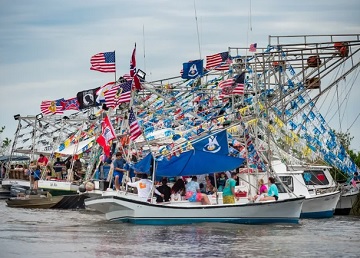
Blessing of the Fleet: Boat blessings return to Terrebonne and Lafourche
After Dulac was ravaged by Hurricane Ida, this year’s shrimp boat blessing holds a special place for the Rev. Antonio Speedy of Holy Family Catholic Church. “Hurricane Ida has turned our community upside down,” he said. “It’s not the first time the people here have been through a hurricane, but this one was different from the rest. Many people have been left homeless, and the fishing season has started off slowly. There was debris all over the water.” After months of recovery, Speedy said blessing shrimp boats was the last thing on his mind. But as April approached, he began getting requests for the annual tradition. Photo gallery, >click to read< 12:24
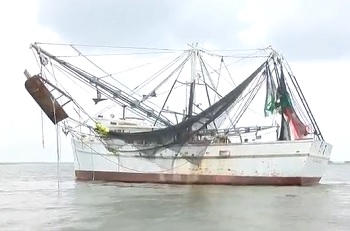
Georgia: Impacts of Coronavirus pandemic on selling shrimp
It’s been three months since the start of shrimp season. Back in June, a McIntosh County shrimp boat captain said his first catch could have been better. Shrimp boats hit the Georgia waters early in the morning Thursday. Darrell Gale said he’s had average catches, but when it comes time to selling the shrimp, that’s where he’s struggling. >video, click to read< 10:07
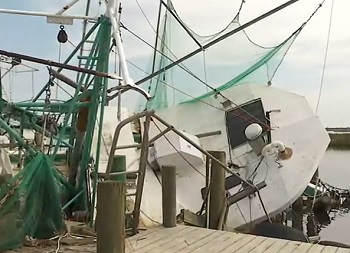
Blue Horizon Seafood closed their doors and evacuated for Hurricane Laura. Half of their boats did not survive.
One Hackberry business is dedicated to serving its community with the freshest seafood, but after being hit by Hurricane Laura, they’re not sure when they’ll be able to reopen. Out of the 27 boats docked at Blue Horizon only 14 survived the storm. “The boats that went down they can’t be recovered, they’re all tore up just like this right here and 11 of our fleet is down I think there’s only about 14 left in the fleet. But everyone Is trying to pick up the pieces at the house and they’ll come to see what they can do with the boats.” video, click to read< 12:52
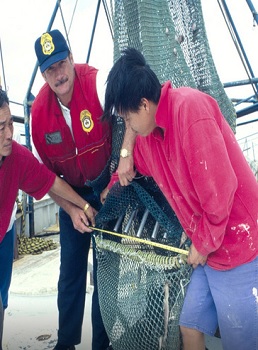
Turtlegate: Net Escape Doors Versus the Doors of Government
This week, a 50 pound Loggerhead was rescued on Cape Cod.,, Kemp’s Ridley turtles are endangered and although it cannot be confirmed if there is a direct connection between these cold-stunning incidents and interaction with fishing boats, trawler net entanglement remains the number one culprit for sea turtle trauma and mortality. huh! Let’s turn our attention to this critical man-made danger that affects all ocean mammals and sea life in general,,, we see where this is going, >click to read< 09:33
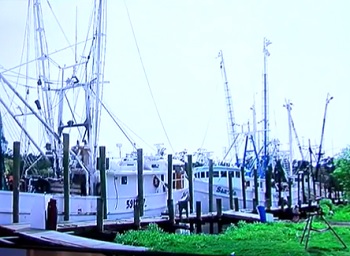
McClellanville working to preserve working waterfront
McClellanville is a small town working towards a big catch. The town is trying to protect one of last working waterfronts in the Lowcountry. Fishing and shrimping remain a major source of income for many residents. However, the future of the local docks is uncertain. The docks sit along Jeremy Creek, ushering in boats from sun up to sun down. The town has been partnering with the South Carolina Sea Grant Consortium, Carolina Common Enterprise, and the East Cooper Land Trust, on developing a plan to save the docks. >click to read<18:01

Gulf shrimp season opens Sunday in state and federal waters while shrimp boats will set out lacking workers
Tuesday’s blessing-of-the-fleet event at the Brownsville Shrimp Basin felt similar to the one a year ago, with a sermon from Father Mark Watters and an issue over the shortage of workers. After facing a slight scare of almost not making it to Brownsville, Watters said his 13th year blessing the Brownsville-Port Isabel shrimp fleet was not only a number, but a message of multiplication of double profusion.“Now, 13, in the kingdom of heaven, that number, when you see it in scripture, what the enemy has stolen and made people superstitious about is actually a kingdom number that equates to double profusion,” he said. Still, the shortage of foreign workers will remain a challenge the shrimp industry has to overcome. >click to read<10:56
Roughly 150 Boats Take Part in ‘Blessing of the Fleet’ – The executive director of the Texas Shrimp Association says, however, a shortage U.S. citizen and foreign workers will cost the industry an estimated $700,000 per day this year. Video,>click here<
Shrimp fishermen take issue with proposed TED rule
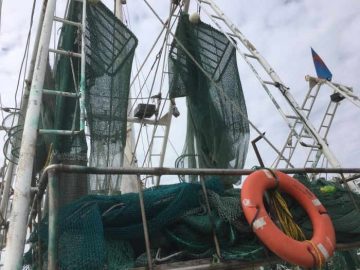 Shrimp boats that fish offshore already use TEDs. Turtle excluder devices use metal grates that prevent turtles from getting caught in the nets. The new rule would apply to skimmer nets, which generally shrimp in shallower waters. “It would affect about half of our fleet, which currently uses skimmer nets. They’ve been having to adhere to tow time restrictions. Now, they’ll have to use TEDs instead,” said Rick Burris, who directs the DMR Shrimp and Crab Bureau. The proposed regulation to expand the use of TEDs is the result of a federal lawsuit filed by a nonprofit conservation group called Oceana, which blames commercial fishermen for killing hundreds of sea turtles each year. “Certainly they’re being singled out. Oceana has had the shrimp industry as a target for a long time. Particularly as it relates to turtles,” said David Veal, executive director of the American Shrimp Processors Association. Veal says the statistics cited by the conservation group are suspect. Video, read the rest here 08:14
Shrimp boats that fish offshore already use TEDs. Turtle excluder devices use metal grates that prevent turtles from getting caught in the nets. The new rule would apply to skimmer nets, which generally shrimp in shallower waters. “It would affect about half of our fleet, which currently uses skimmer nets. They’ve been having to adhere to tow time restrictions. Now, they’ll have to use TEDs instead,” said Rick Burris, who directs the DMR Shrimp and Crab Bureau. The proposed regulation to expand the use of TEDs is the result of a federal lawsuit filed by a nonprofit conservation group called Oceana, which blames commercial fishermen for killing hundreds of sea turtles each year. “Certainly they’re being singled out. Oceana has had the shrimp industry as a target for a long time. Particularly as it relates to turtles,” said David Veal, executive director of the American Shrimp Processors Association. Veal says the statistics cited by the conservation group are suspect. Video, read the rest here 08:14
City Hall does not like to be harsh, especially to those in the commercial shrimping industry these days. But they’re gonna be.
![]() The individuals and families who trawl Georgia’s waters have enough problems surviving year to year with all the government regulations they must comply with and the flood of cheap imports from just about every continent on the globe they must compete with before, during and after the legal season for fishing in Southeastern United States. (feelin’ the love?) more@thebrunswicknews 15:14
The individuals and families who trawl Georgia’s waters have enough problems surviving year to year with all the government regulations they must comply with and the flood of cheap imports from just about every continent on the globe they must compete with before, during and after the legal season for fishing in Southeastern United States. (feelin’ the love?) more@thebrunswicknews 15:14

































